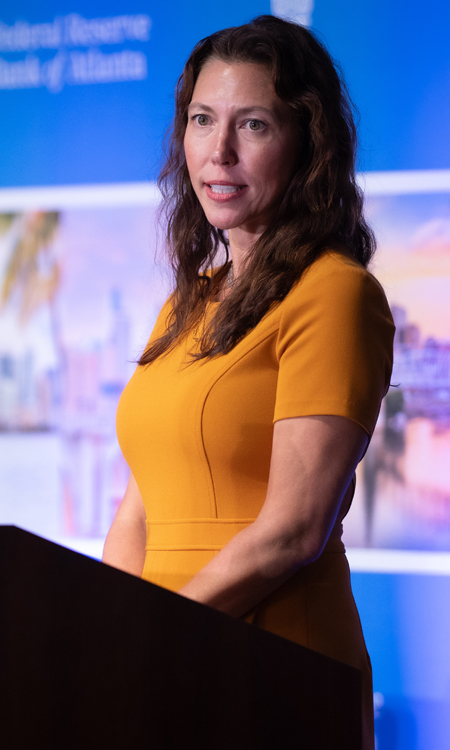
The Atlanta Fed is participating in the mounting effort to address check fraud, a crime that's booming despite the ever-shrinking number of checks businesses and consumers write.
To deepen its understanding of check fraud, the Atlanta Fed conducts ongoing research into the nation's payments system. The information helps keep stakeholders—which includes consumers, businesses, Reserve Banks and their branches, financial institutions, nonbank payment service providers, and policymakers—aware of trends in payments. The magnitude of the problem shows up in a survey by the Atlanta Fed and Federal Reserve Financial Services. The survey finds that the value of possible check fraud grew faster than the value of checks collected from 2018 to 2021.
The Federal Reserve Payments Study, a project led by the Atlanta Fed and the Federal Reserve Board of Governors, gathers information about noncash payments fraud of all types, including check fraud. Beyond that, the Atlanta Fed's Survey and Diary of Consumer Payments Choice reports on consumers' experiences of fraud in payment methods including checks, which can be stolen, altered, or forged.
These programs are part of the Atlanta Fed's multifaceted efforts to learn about check fraud, which inform discussions about ways to stem it, according to Jessica Washington, an assistant vice president of research at the Atlanta Fed.
 The Atlanta Fed's Jessica Washington |
"Our evidence-based research also includes qualitative methods to gather diverse perspectives and grassroots insights," Washington said. "We are leveraging our unique proximity to Transaction Alley, a historically innovative, and impactful payments/fintech hub, to understand what innovations provide improvements in fighting fraud. Several members of our team participate on task forces and advisory committees hosted by law enforcement agencies."
The Atlanta Fed's programs operate as federal banking regulatory agencies mull other steps they could take to curb payments fraud affecting consumers, businesses, and financial institutions. The Federal Reserve Board, the Office of the Comptroller of the Currency, and the Federal Deposit Insurance Corporation are contemplating five areas where they could potentially mitigate payments fraud, including ways the agencies could collaborate with key stakeholders, improved payment fraud education, augmenting regulatory or supervisory actions, and improving the collection and sharing of fraud data. Federal bank regulatory agencies also asked the public to offer thoughts on the Federal Reserve Banks' tools and services to reduce payments fraud.
The three regulatory agencies jointly issued the request for information and comment. The Fed's vice chair for supervision, Michelle W. Bowman, said in a June 2025 statement that she is committed to collaborate with a wide range of state and federal partners, including law enforcement, to address the issue.
Check fraud has reached the point that the Treasury Department in 2024 listed it as a previously underrecognized national security threat, along with Russian money laundering, tax crime, illegal online gambling, and unlawful campaign finance, according to the 2024 National Money Laundering Risk Assessment. Check fraud enables criminal enterprises to expand and endangers the nation's payments system, which is the bedrock of the United States' financial system.
Common sense suggests that check fraud should diminish alongside the decline in check usage. But that's not the case, as Atlanta Fed and other researchers have established. Since the COVID-19 pandemic, the number of real or attempted check fraud transactions grew nearly fourfold, even as the number of checks paid fell by more than 18 percent from 2018 to 2021, according to a report by the Treasury Department and a calculation of figures in a report by the Federal Reserve.
Meanwhile, checks that are being written are for larger sums than in the past. The average value per check rose by 60 percent in the past seven years, from $1,772 in late 2018 to $2,830 in early 2025, according to a report of checks processed by the Fed.
Check fraud can start with the theft of checks from the US Postal Service. Thieves might steal or purchase the key that opens the blue mail deposit boxes and steal mail. Postal employees have been convicted of stealing checks in transit. Checks can be stolen from home mailboxes. And on the clandestine market, stolen checks are hot commodities. Criminals can cash a check for face value or alter it to nab a higher value. Personal checks have great value to criminals who can harvest the significant personal data they contain: a full legal name, bank account number and routing number, home address, signature, and sometimes a date of birth, phone or driver's license number (or both), and possibly an affinity tag that shows where the accountholder went to college, opening the door to other financial crimes.
Given the scope of the problem, banks across the United States generally support federal bank regulatory agencies' efforts to curb check fraud. "We've done about all we can do, from technology to best practices to consumer education, and we've asked regulators to partner with us because the message is different when it comes from a regulator," said Tripp Cofield, president of the Georgia Bankers Association.
Although the injured parties in check fraud vary, the cost can ultimately fall on bank shareholders, in the form of lower returns, and on bank customers, in the form of higher account costs to help offset depositor insurance programs. Ideally, the bad actor will be brought to justice and compelled to repay funds. But if the crime goes unsolved, the cost falls on the entity that was in the best position to halt the transaction, whether that entity was the customer, the bank on which the check was drawn, or the bank where the check was presented.
Sam Drennen, executive vice president and chief operating officer of First American Bank & Trust in Athens, Georgia, described a case where the bank had to absorb a significant loss when one of the bank's commercial clients sent a check to the IRS, but the check was intercepted, stolen, and cashed. The client, who saw the sum had cleared the account, learned of the incident only when the IRS later called to inquire why it hadn't received the payment.
"Shareholders had to eat that bottom line charge-off," Drennen said. "That's when I started realizing we had holes in our security. I threw people on the problem, then we got software. We learned a lesson the hard way."




